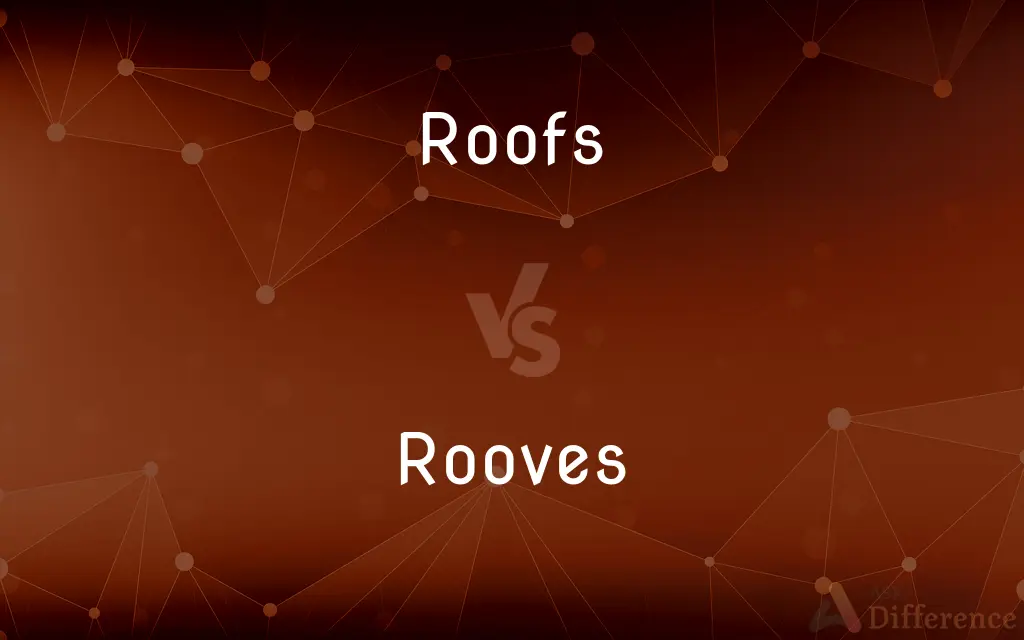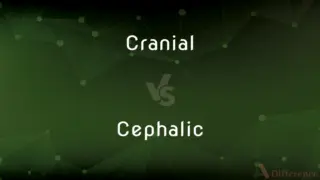Roofs vs. Rooves — What's the Difference?
Edited by Tayyaba Rehman — By Fiza Rafique — Updated on October 25, 2023
"Roofs" is the standard plural form of "roof" in modern American English. "Rooves" is an older, now rarely used, plural form of "roof."

Difference Between Roofs and Rooves
Table of Contents
ADVERTISEMENT
Key Differences
"Roofs" and "Rooves" both pertain to the plural form of the noun "roof," which refers to the top covering of a building. In modern American English, "Roofs" is the accepted and widely used plural form. When you have more than one "roof," you would typically refer to them as "Roofs." For example, in contemporary writing or conversations, one might say, "All the Roofs in the neighborhood were covered in snow."
On the other hand, "Rooves" was once an accepted plural form, much like "hooves" is the plural of "hoof." However, over time and with the evolution of language, "Rooves" became less common, and "Roofs" became the dominant form. Although some older texts or dialects might still use "Rooves," it is now considered archaic.
Both "Roofs" and "Rooves" serve the same function grammatically as plural nouns. However, it's essential to understand the context in which you're using them. In most modern contexts, particularly in American English, "Roofs" would be the correct choice. On the flip side, if one is trying to emulate older styles of writing or speaking, "Rooves" might be used, albeit rarely.
Conclusively, while "Roofs" and "Rooves" might appear to be interchangeable at first glance, the nuances of modern language usage favor "Roofs." If in doubt, it's always safer to opt for "Roofs" in contemporary communication.
Comparison Chart
Usage
Modern standard plural form
Older, now archaic plural form
ADVERTISEMENT
Popularity
Predominant in American English
Rarely used
Context
Contemporary writing and speech
Older texts or dialects
Grammatical Role
Plural noun
Plural noun
Example
Many Roofs in the city were damaged.
(Archaic) The Rooves were thatched in straw.
Compare with Definitions
Roofs
Plural form of the top covering of a building.
The Roofs of the old houses were steep and pointed.
Rooves
Archaic term for the upper limit or level.
The Rooves of prices were set by the king.
Roofs
The framework and outer covering of a vehicle.
The Roofs of the cars were covered in hail dents.
Rooves
The highest point or level, in archaic terms.
The Rooves of those hills were impossible to climb.
Roofs
The highest point or limit.
The Roofs of the mountains touched the sky.
Rooves
Archaic plural form of the top covering of a building.
The Rooves were made of thatch in olden times.
Roofs
A protective or sheltering structure.
The Roofs provided shade during the hot day.
Rooves
Archaic plural form for the framework of a vehicle.
The Rooves of the carriages were ornately decorated.
Roofs
The upper limit or level of prices or wages.
The Roofs of these products have skyrocketed.
Rooves
An archaic term for a protective structure.
The Rooves gave shelter from the rain.
Roofs
The exterior surface and its supporting structures on the top of a building.
Rooves
Plural of roof
Roofs
The upper exterior surface of a dwelling as a symbol of the home itself
Three generations living under one roof.
Roofs
The top covering of something
The roof of a car.
Roofs
The upper surface of an anatomical structure, especially one having a vaulted inner structure
The roof of the mouth.
Roofs
The highest point or limit; the summit or ceiling
A roof on prices is needed to keep our customers happy.
Roofs
To furnish with a roof or cover.
Roofs
Plural of roof
Roofs
(to install a roof)
Common Curiosities
Is "Rooves" still commonly used today?
No, "Rooves" is considered archaic, and "Roofs" is more common.
Why did "Rooves" fall out of favor?
Language evolves, and "Roofs" became the more accepted plural form over time.
Can I come across "Rooves" in older literature?
Yes, "Rooves" might be found in older texts or specific dialects.
Does "Rooves" sound old-fashioned?
Yes, "Rooves" is considered old-fashioned in today's English.
Are there other meanings for "Roofs" besides building tops?
Yes, "Roofs" can refer to the upper limits, vehicle coverings, or highest points.
Can I use "Rooves" in formal writing?
It's best to use "Roofs" in modern formal writing.
Is "Rooves" considered incorrect?
Not incorrect, but it's archaic and rarely used today.
Why does "hoof" become "hooves" but not "roof" to "rooves"?
Language evolution and standardization have led to such inconsistencies.
Are "Roofs" and "Rooves" grammatically correct?
Both are grammatically correct, but "Roofs" is standard in modern American English.
Is it "roof's" or "roofs'" for possession?
"Roof's" for singular possession and "roofs'" for plural possession.
Are there regions where "Rooves" might still be common?
It's rare, but some older generations or specific regions might use "Rooves."
How can I decide between "Roofs" and "Rooves"?
Stick to "Roofs" for modern communication, unless emulating older styles.
Can "Rooves" and "Roofs" be used interchangeably in poetry?
While "Roofs" is standard, poets might use "Rooves" for stylistic or rhythmic reasons.
Does British English use "Rooves"?
Both "Roofs" and "Rooves" have been used, but "Roofs" is now standard in British English too.
Are there other words like "Roof" that have changed plural forms?
Yes, English has many words that have seen shifts in plural forms over time.
Share Your Discovery

Previous Comparison
Cranial vs. Cephalic
Next Comparison
Respect vs. LoyaltyAuthor Spotlight
Written by
Fiza RafiqueFiza Rafique is a skilled content writer at AskDifference.com, where she meticulously refines and enhances written pieces. Drawing from her vast editorial expertise, Fiza ensures clarity, accuracy, and precision in every article. Passionate about language, she continually seeks to elevate the quality of content for readers worldwide.
Edited by
Tayyaba RehmanTayyaba Rehman is a distinguished writer, currently serving as a primary contributor to askdifference.com. As a researcher in semantics and etymology, Tayyaba's passion for the complexity of languages and their distinctions has found a perfect home on the platform. Tayyaba delves into the intricacies of language, distinguishing between commonly confused words and phrases, thereby providing clarity for readers worldwide.
















































